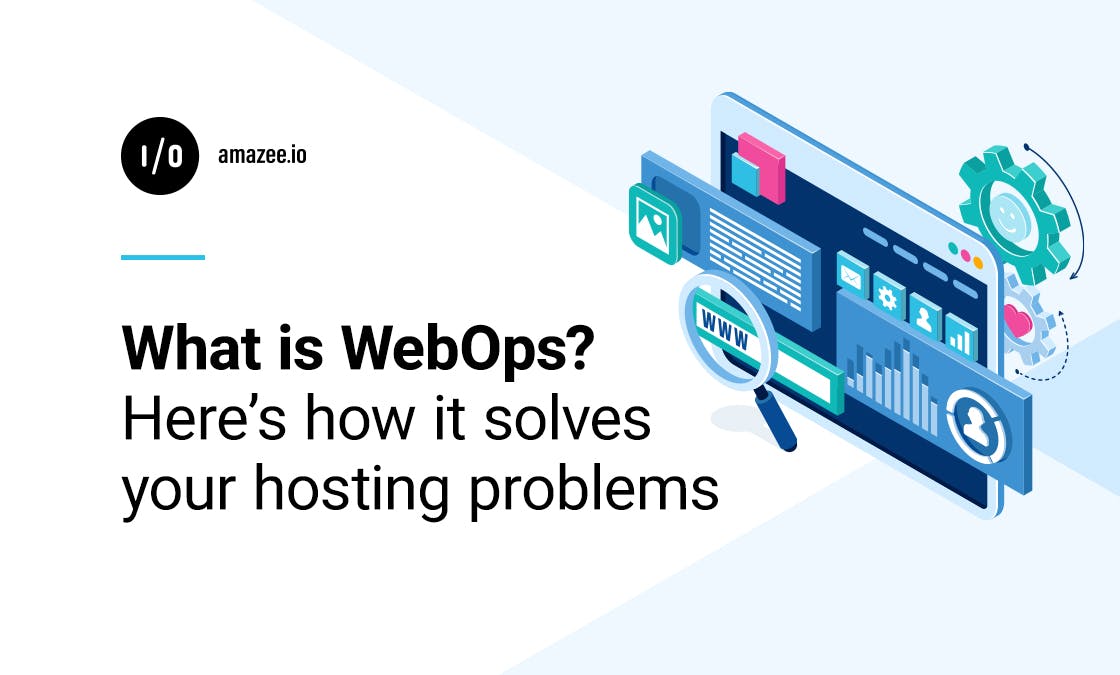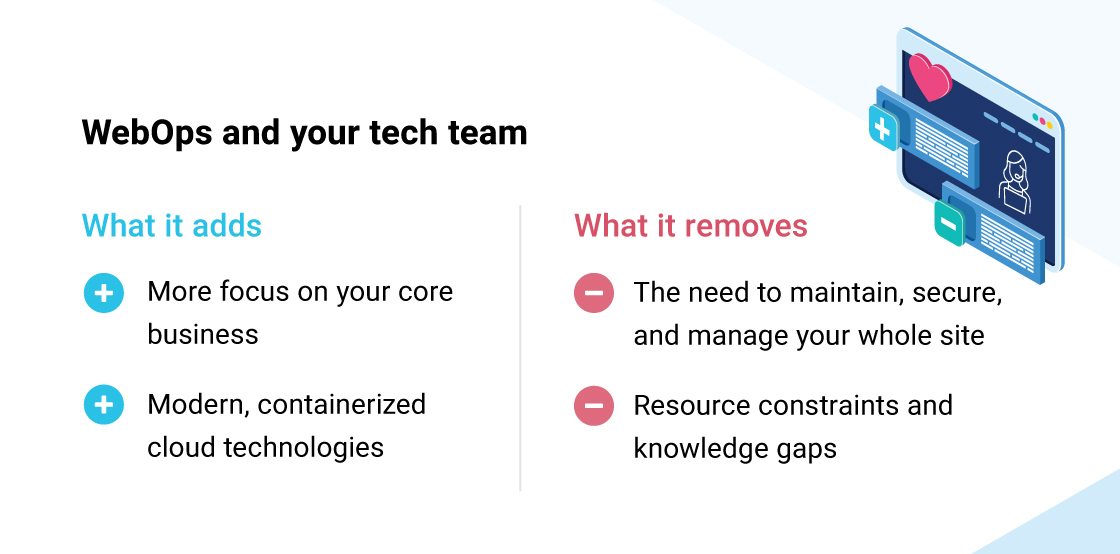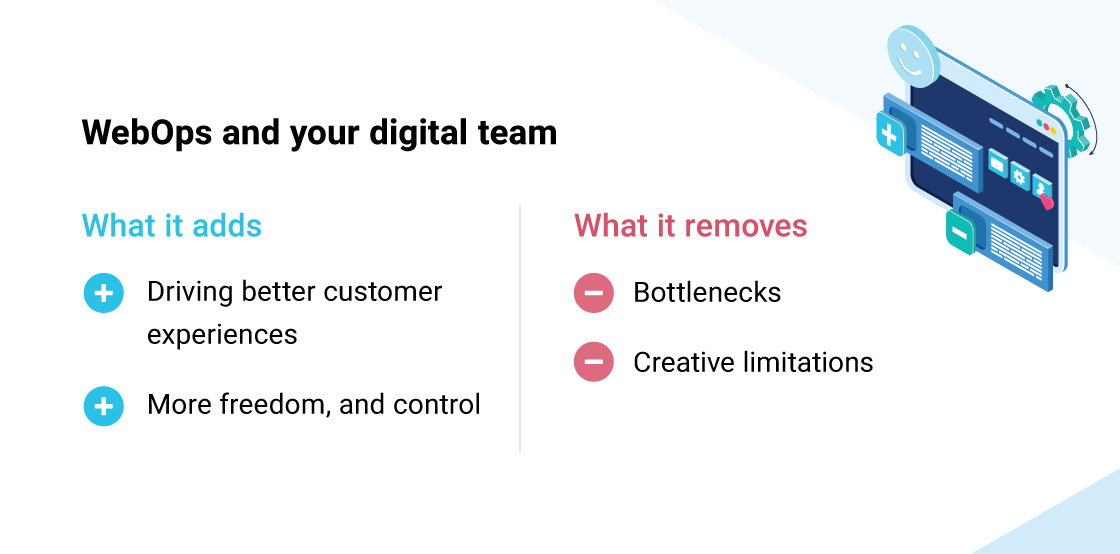Bryan Gruneberg
|
Mar 15, 2022
|5 min read
Search Topic

In 2022, your online business presence is more important than ever - and your website is the central hub of presence. Your overall site performance has a profound impact on how your end-users or customers will interact with your business - which directly links to your conversions, revenues, and bottom line.
In other words, your website is pretty important.
If you’re looking for a better solution for your website, you may have come across the term ‘WebOps’ online - but what does it actually mean?
WebOps emerged as a practice to help businesses (like yours) dramatically improve how they build, host, manage, maintain, secure, and extend their sites and web apps - for better business results.
The term “WebOps” refers to a collection of processes and practices that ensure smooth deployments, operations, and management of your sites and web apps. WebOps practices and platforms are there to increase the productivity and efficiency of the whole web team for a smoother and more integrated hosting operations experience - which leads to better efficiency, faster timelines, and easier deployments.
Increased automation, faster testing, better scalability, and operational transparency are central to the WebOps principles, which are intimately related to Agile and DevOps methodologies.
The end result of adopting WebOps principles and platforms is faster testing and updates, better efficiency, reduced overall costs associated with owning and managing your site, and improved scalability in case of high-traffic events. In a nutshell, WebOps offers a more effective way to manage your website while focusing on your core business goals.
WebOps platforms and legacy hosting services have a few of the same capabilities, like hosting sites and web apps and monitoring uptime.
But that’s where the similarities end - a WebOps platform offers a much more complete solution for improving your team’s success, your website’s function, scalability, updates, security, and speed. Legacy hosting options often have no consolidated approach to operations. As each vendor and team takes their approach, infrastructure implementations vary widely and are often hard to scale, monitor, and maintain.
WebOps is the new way modern businesses set themselves up for success online. In fact, many companies using WebOps consider it “the future of digital business operations.”
IT teams struggle with resource bandwidth. Many small development teams struggle with resource allocation for their web operations. These may be things that business operations or marketing managers want to do to drive results. Still, they’re limited because IT teams simply don’t have the bandwidth to create multiple new landing pages, support daily updates, test frequently, and deploy apps to production.

Another significant obstacle for IT teams?
They want to use a more modern framework and containerized technology. Still, the operations team may not have the internal knowledge and capacity to cover these emerging trends and technologies.
To combat this, WebOps platforms typically come with these modern technologies as part of their offering - empowering developers to make production changes without relying on hosting or system engineers.
Business leaders aren't seeing the site results they want. On the business side, leaders often become frustrated because they want to ramp up their online presence, but there are limitations to their team's capabilities. Development teams struggle to manage these projects on top of their other work, and many IT employees have to sideline more creative, innovative projects to work on their website hosting.

In fact, WebOps encourages increased collaboration between all teams since the increased efficiencies ensure that updates can be made frequently without taxing an in-house engineering team. A WebOps platform can empower marketing and business operations to move at the speed they desire, along with providing the ability to experiment and continue improving the experience for site users.
On the tech side, embracing the right WebOps platform can free teams from the sometimes tedious and repetitive processes involved with web operations work.
In other words, everyone can do their jobs better and drive results - all thanks to the support and opportunities a WebOps platform provides.
It just makes life easier.
WebOps platforms perfectly fit businesses that want to improve their multi-channel marketing strategies without overtaxing their internal teams.
WebOps platforms are also future-facing since they support businesses with a large or rapidly changing online presence. With the right WebOps platform, testing and updates are much quicker and low-risk, unlike legacy hosting.
If you want to adopt WebOps principles for your business and site, it’s best to start by reviewing your current situation and structure. Look at your current deployment systems and principles to understand where you are and where your team is. How are things currently working?
This review should help you identify a few solid pain points to address when searching for your new solution. This is important because it’s critical to select a WebOps platform that solves YOUR problems specifically for the greater benefit of your team and site. You want your WebOps platform to truly change how your team does things and remove that bottleneck for your development team.
If you’re concerned about making such a big change with your current solution and the migration process, consider a WebOps offering running in your current cloud infrastructure. No need to pay another hosting vendor for additional infrastructure because it will use the one you already have.
Dedicated Cloud by amazee.io is easy to use and easy to deploy. It can support all web technologies, languages, frameworks, and hosting infrastructures out there- not just some of them. It’s truly an all-in-one building, hosting, and maintenance solution that leaves control in your hands - but we’ll do the heavy lifting.
With Dedicated Cloud, there are a few things you'll never have to worry about again: Data sovereignty, security, and support when you need it most. We are available 24/7/365 for support with our team of engineers and Kubernetes experts.
Want to see how other companies are leveraging the powers of our Dedicated Cloud offering?
To learn how Dedicated Cloud would work specifically for your business and your needs, reach out to us and we’ll create a roadmap for you.
To follow the conversation about WebOps, connect with Bryan on LinkedIn or Twitter.
Updated: 2. September 2024

